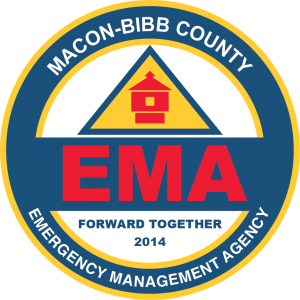Earthquake
An earthquake is a sudden, rapid shaking of the ground caused by the shifting of rocks deep underneath the Earth’s surface. Initial mild shaking may strengthen and become extremely violent within seconds. Earthquakes can cause fires, tsunamis, landslides, or avalanches. Additional earthquakes, called aftershocks, may follow the initial earthquake. While most are smaller than the initial, aftershocks can occur for hours, days, or even months, creating significant damage in that area.
Although earthquakes are not common to the middle Georgia area, earthquakes can happen anywhere at any time, and there is no way to predict them. Prepare now to protect yourself, your loved ones, and your home.
During an earthquake, you should Drop, Cover, and Hold On to protect yourself from falling debris. Practice with your entire household so everyone knows what to do. Here is how to practice:
DROP where you are onto your hands and knees.
- This position protects you from being knocked down and allows you to crawl to a protected space.
COVER your head and neck with your arms.
- If a sturdy table or desk is nearby, crawl underneath it for protection.
- If you cannot find a protected space, crawl to an interior wall, away from windows.
HOLD ON until the shaking stops.
- If you’re under shelter, hold onto it with one hand while covering your neck and head with the other. If there’s no shelter, use both hands to cover your neck and head.
To prevent injuries, identify things in your home that might fall during intense shaking. Consider items such as televisions, mirrors, pictures, refrigerators, bookcases, etc. Secure these items so they don’t injure you during an earthquake. Straps, hooks, latches, and other safety devices are widely available and strong recommended, especially if you’re in an area prone to earthquakes. Additionally prepare your home by repairing any deep cracks in walls, ceilings, and foundations, and repairing defective electrical wiring, water, or gas connections.
The violent shaking from earthquakes can trigger landslides, leaving your home vulnerable to serious structural damage, especially if it was built before 1980. Make sure to understand the potential structural risks to your home so that you may find a proper solution.

